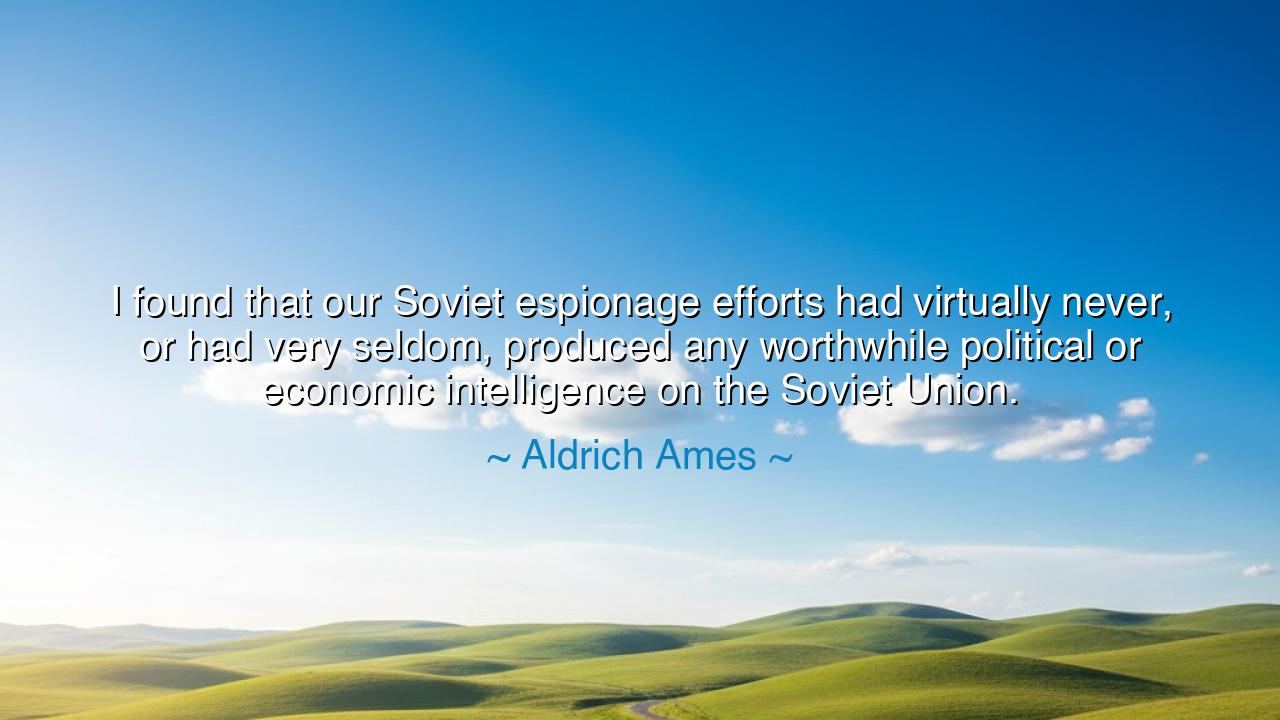
I found that our Soviet espionage efforts had virtually never, or
I found that our Soviet espionage efforts had virtually never, or had very seldom, produced any worthwhile political or economic intelligence on the Soviet Union.






When Aldrich Ames declared, “I found that our Soviet espionage efforts had virtually never, or had very seldom, produced any worthwhile political or economic intelligence on the Soviet Union,” he was not simply speaking of failure—he was revealing the emptiness at the heart of deception, the futility of seeking truth through corruption. His words echo with irony and tragedy, for they come from a man who himself betrayed his nation, selling secrets to the very enemy he described. Yet within this confession lies a deeper wisdom: that knowledge without integrity is blindness, and power without understanding is ruin.
Ames had spent years as a high-ranking officer within the Central Intelligence Agency (CIA) during the Cold War—a time when the world was divided not only by ideology, but by fear. Espionage was the shadow war of that era, waged not with armies but with whispers, betrayals, and secrets traded in dimly lit rooms. The United States sought to pierce the iron veil of the Soviet Union, believing that hidden within its walls lay the key to victory or annihilation. Yet Ames’s statement admits what many in his line of work dared not say aloud: that despite all the spies, the networks, and the elaborate deceptions, true understanding eluded them. For even in the realm of intelligence, deceit clouds the eyes of both the deceiver and the deceived.
In the style of the ancients, we may say that Ames’s lament is akin to that of a fallen oracle, one who once sought wisdom but found only echoes of his own folly. The Greeks taught that to know others, one must first know oneself. But in the shadowed halls of espionage, this principle was forgotten. Men and women pursued fragments of truth through lies and treachery, believing themselves clever, while ignorance grew behind the mask of mastery. Ames’s realization—that the vast machinery of intelligence produced little of value—serves as a parable for all who trust in cunning over character, or strategy over sincerity.
History offers a mirror to this revelation. During the fall of Troy, the Greeks achieved their victory not through valor but through deceit—the wooden horse that carried their warriors into the heart of the city. Yet that same deception, which once brought triumph, later became a curse; for the Greeks, too, would face ruin in the wars that followed, consumed by arrogance and betrayal. So it is with espionage when pursued without wisdom: every secret gained through dishonor corrodes the soul of the seeker, and the illusion of knowledge becomes the enemy of truth.
Ames’s statement is thus more than an indictment of intelligence failure—it is a confession of spiritual decay. For how can one hope to understand an adversary when one’s own heart is divided? His words unveil a timeless truth: that understanding cannot be built upon deceit. To truly see the world, one must look not with suspicion but with insight, not through the lens of manipulation but through discernment. When Ames said that espionage had produced “very seldom any worthwhile intelligence,” he unknowingly spoke of a deeper poverty—the moral emptiness of a craft that had lost its compass.
The lesson here, passed down like the wisdom of the elders, is this: truth cannot be forced from shadows. Whether in nations or in individual lives, the pursuit of knowledge must be joined with integrity, or it will crumble into falsehood. The wise do not seek to control others through secrecy, but to understand them through empathy. The warrior who fights with deceit may win a battle, but he loses his own clarity. The leader who governs through fear may secure his power, but he blinds himself to reality. The spy who trades in lies may gather information, but he loses the ability to see truth.
Therefore, let every seeker of wisdom, every guardian of knowledge, take heed of Ames’s lament. Do not build your understanding on deception, for what begins in darkness cannot bear the light. Seek instead to unite intelligence with conscience, knowledge with humility. In every endeavor—whether in leadership, diplomacy, or personal life—let your pursuit of truth be guided by honor. For only when mind and morality walk together can intelligence truly become illumination, and only then will our search for understanding bear the fruit of wisdom rather than the ashes of regret.






AAdministratorAdministrator
Welcome, honored guests. Please leave a comment, we will respond soon